This year’s election has seen an unprecedented voter turnover rate. Some of the constituencies have been strongholds of the pro-establishment camp for many years. Sunday’s district council elections have inflicted a landslide defeat on the bloc.
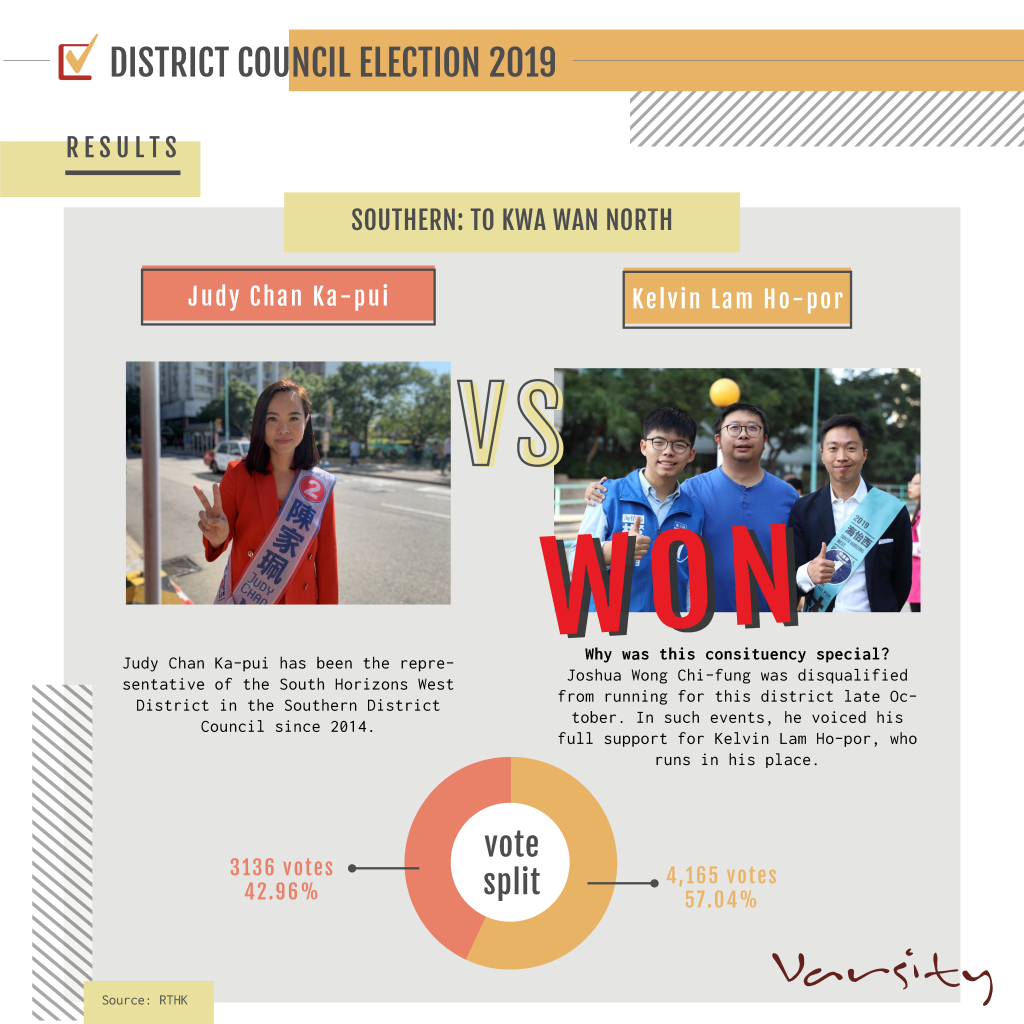
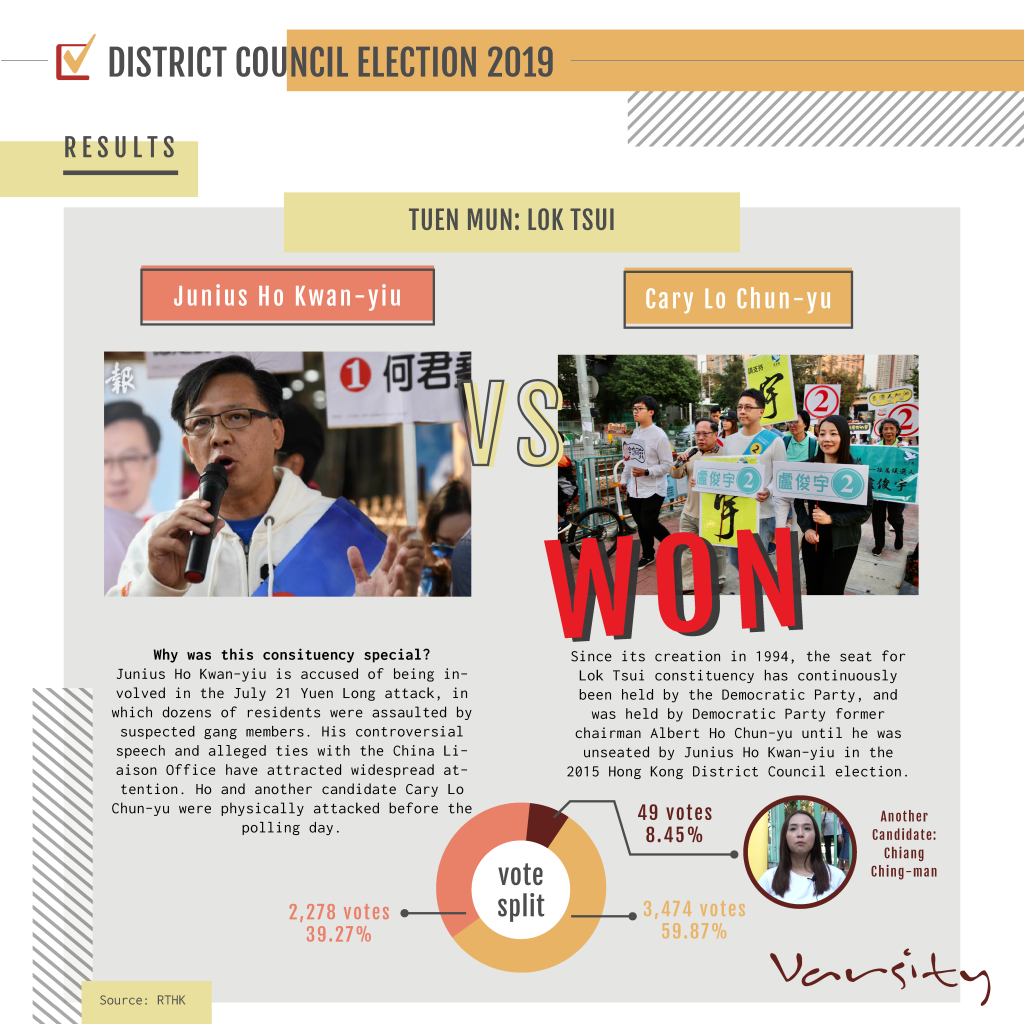
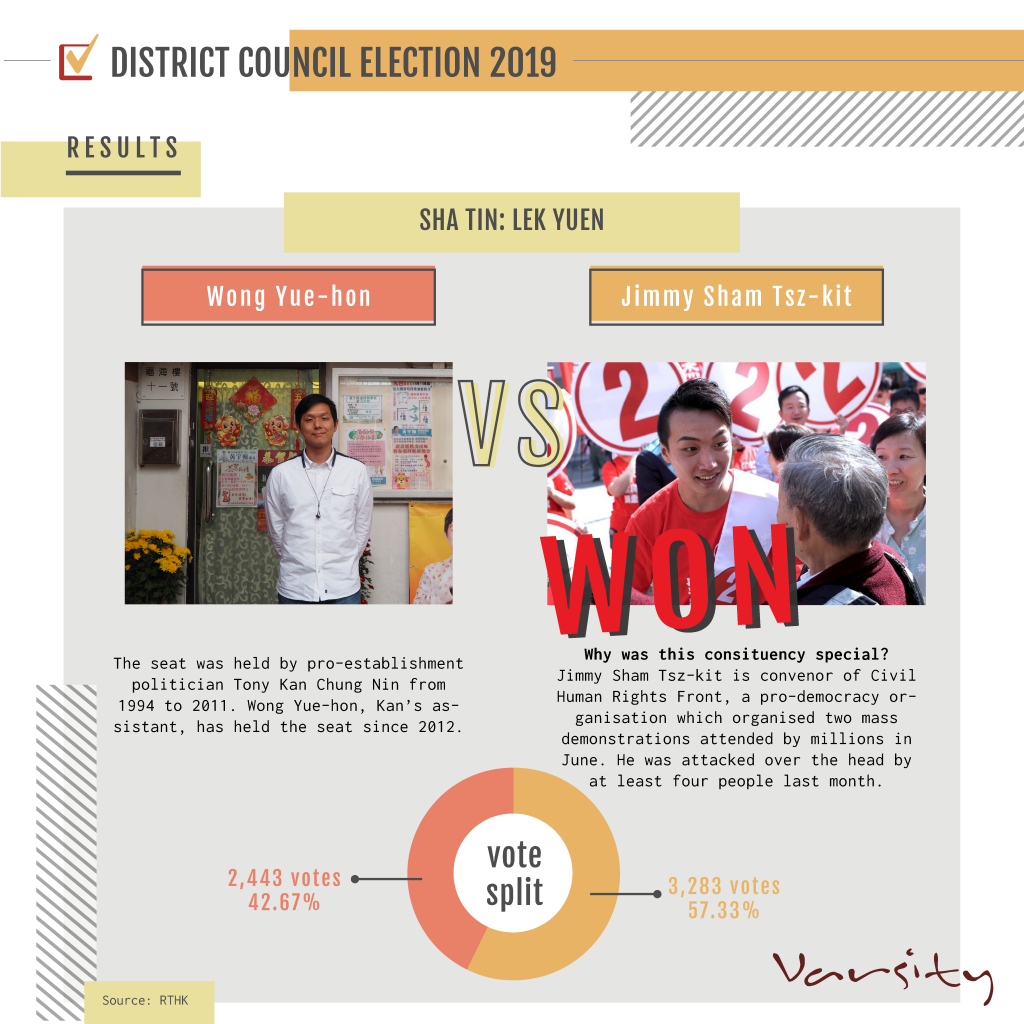
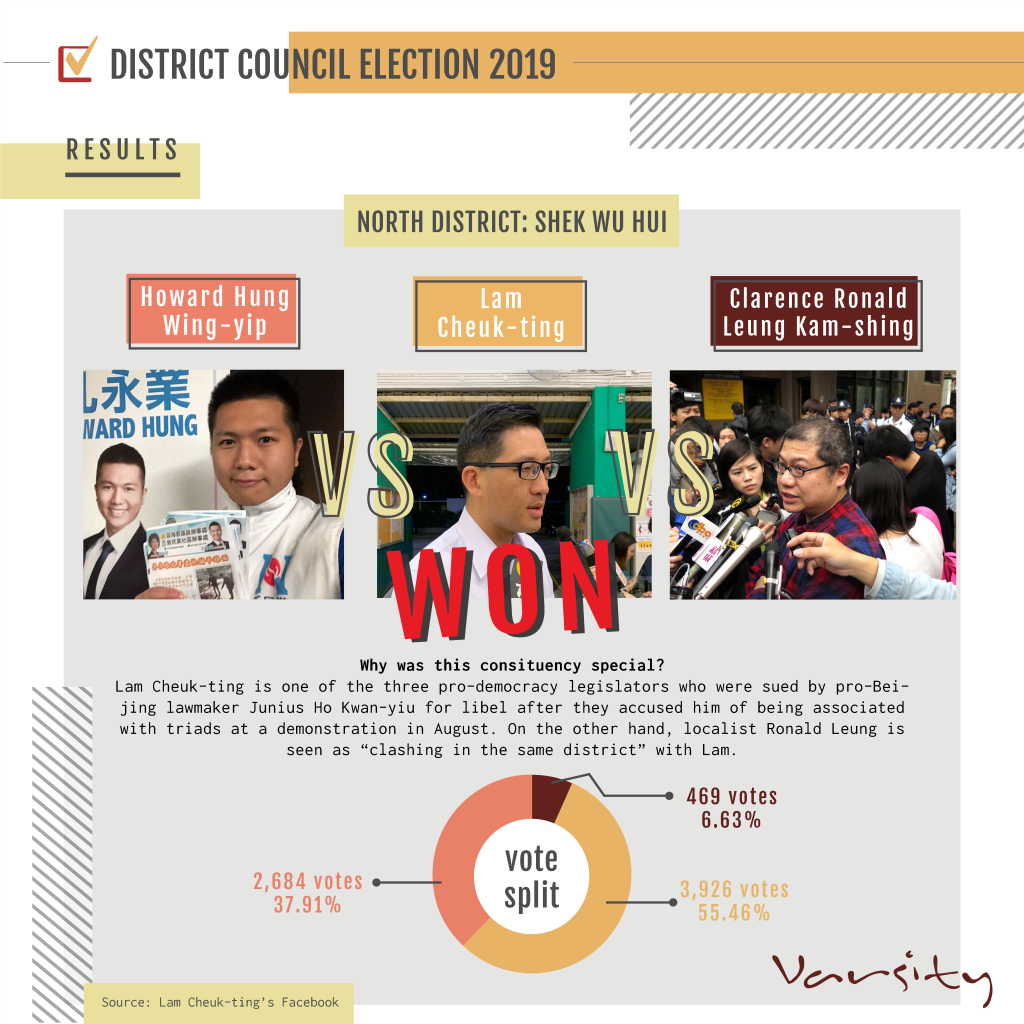
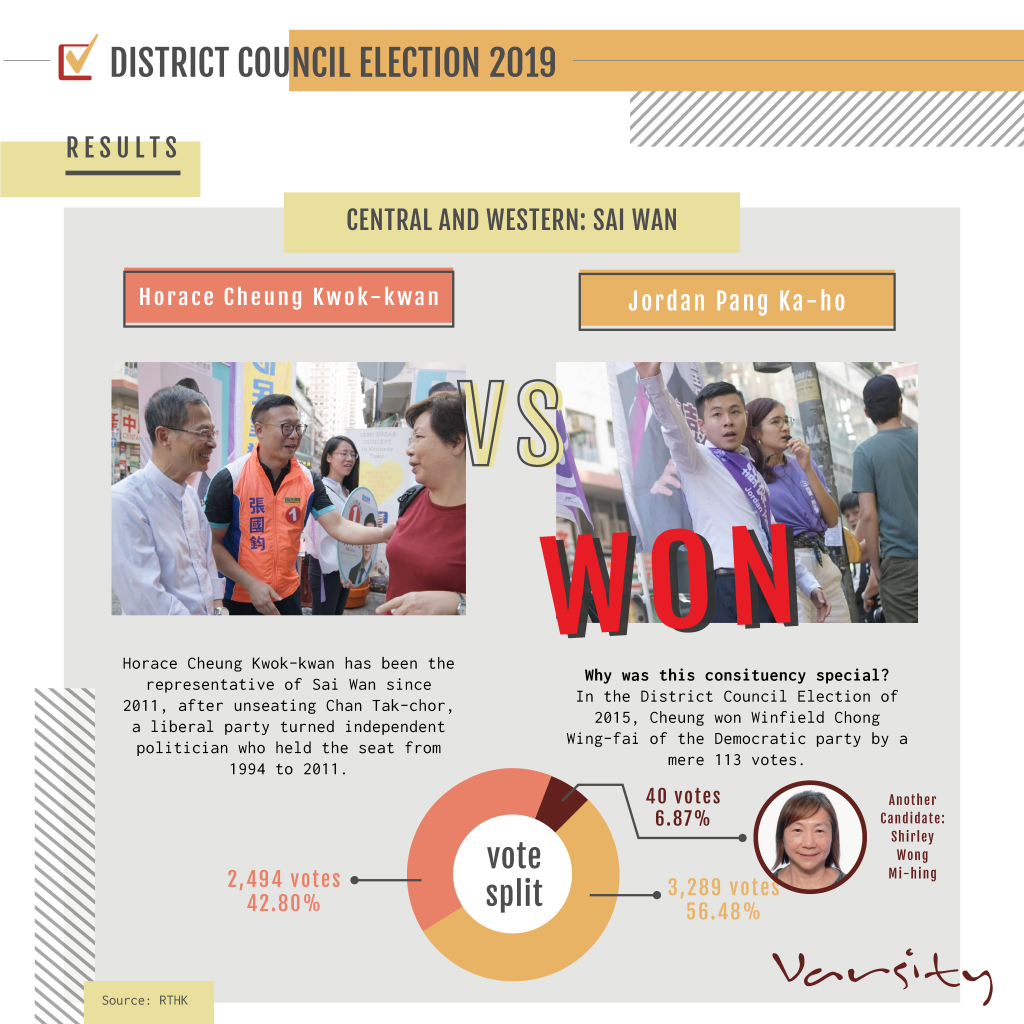

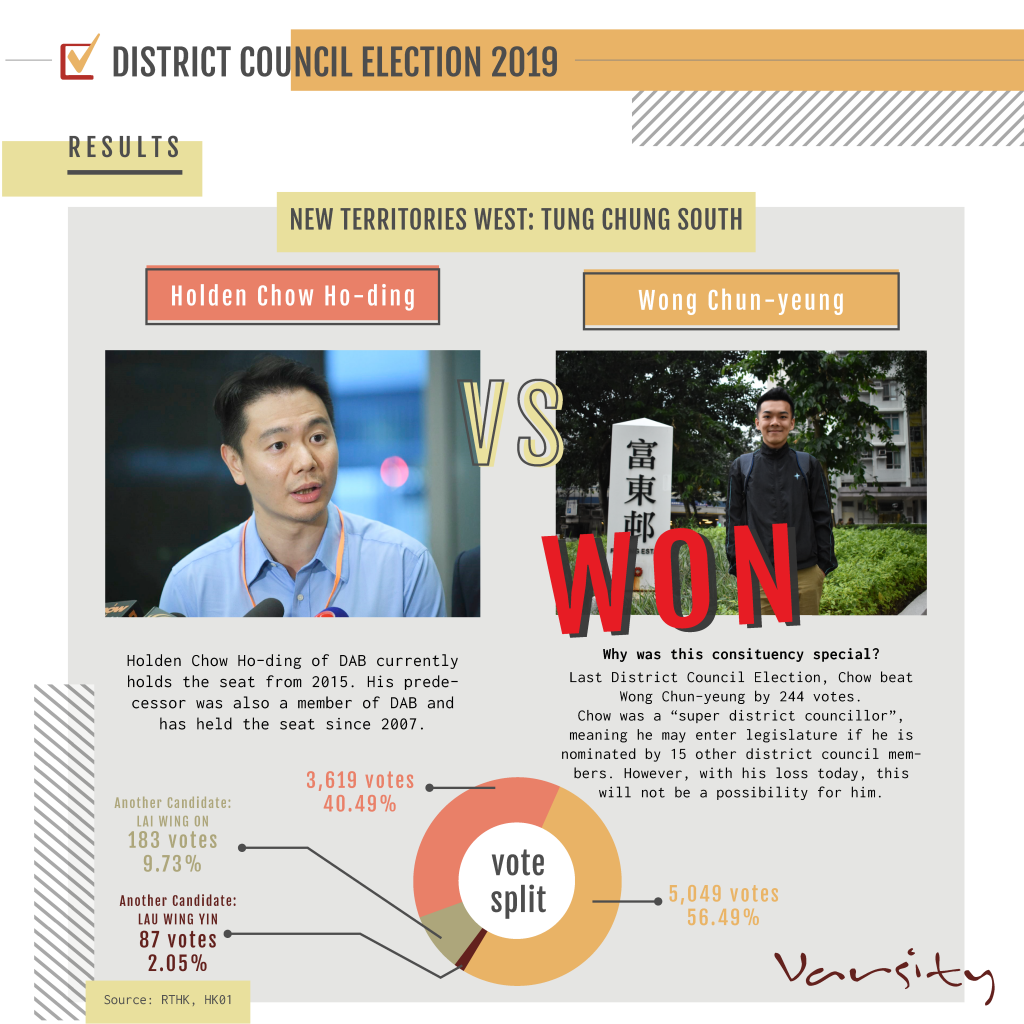
This year’s election has seen an unprecedented voter turnover rate. Some of the constituencies have been strongholds of the pro-establishment camp for many years. Sunday’s district council elections have inflicted a landslide defeat on the bloc.







While district councillors’ work focuses on district affairs, they can also be elected as lawmakers in the Legislative Council through “super district council” seats. This is how incumbent super district councillors fared this election.
The total voter turnover rate of the 2019 District Council Election is 71.20%, making it the most participated election recorded in Hong Kong. With more than 2,940,000 voters, the number of voters this year is doubled compared to that of the District Council Election in 2015.
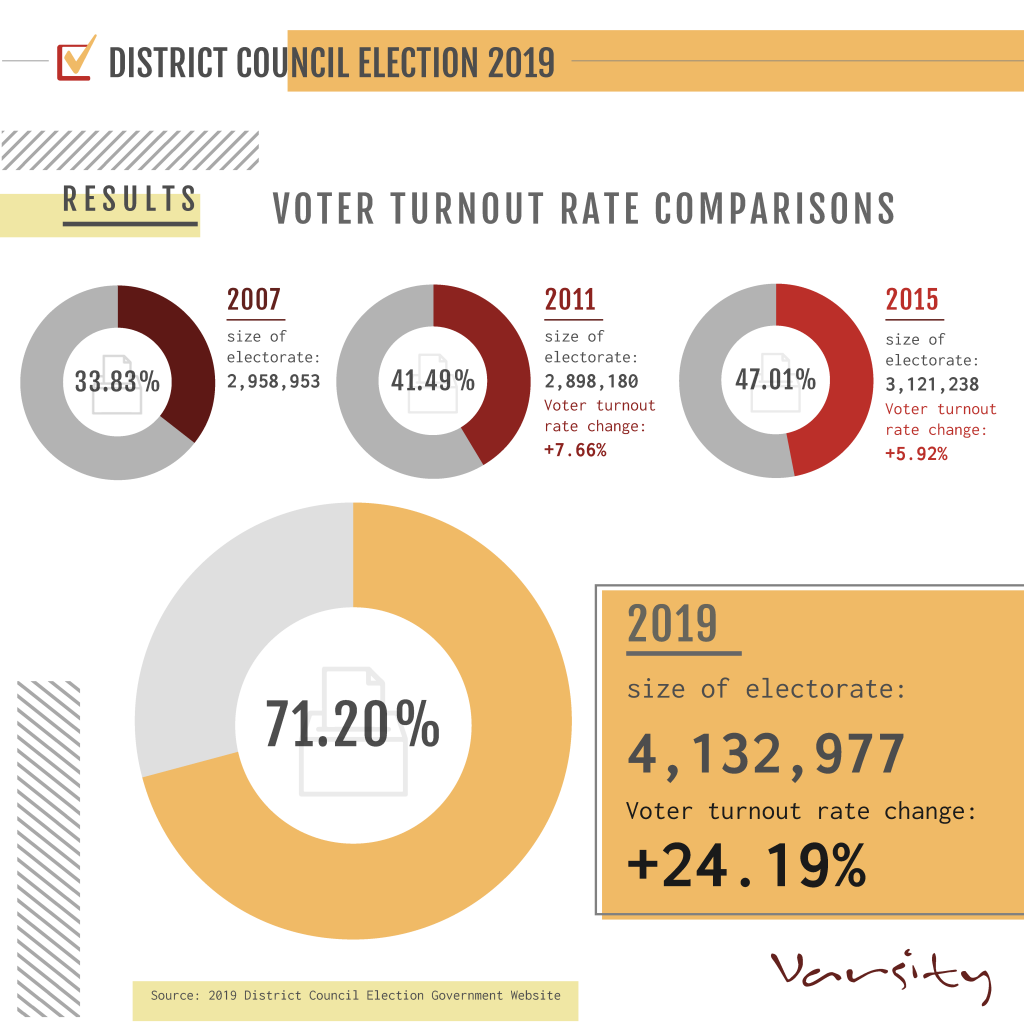
By Howard Li
The 2019 Hong Kong District Council elections are approaching. This year’s elections have seen a lot of young faces emerge. Some of them are former student activists who led the 2014 Umbrella Movement. Five years on, after experiencing the depressing ending of the campaign which failed to achieve any concessions from the government and witnessing Beijing’s tightening grip on the city’s freedoms, especially the disqualifications of young opposition lawmakers, will the Umbrella Generation still regard the elections as an opportunity to make a difference?
Varsity talks to two former student activists who run for the coming District Council elections, Tiffany Yuen Ka-wai and Lester Shum Ngo-fai, to learn about their perspectives and visions.
“A choice for Tin Wan”
Tiffany Yuen Ka-wai, former Vice Chairperson of pro-democracy Demosisto party, is contesting the seat in Southern District Council for Tin Wan constituency. She is now serving as an assistant to legislator Au Nok-hin.
Standing next to her campaign banner bearing a slogan, “A choice for Tin Wan”, Yuen says Tin Wan constituency has been a stronghold of the pro-establishment camp for many years and she wants to give residents one more option in the upcoming election. “I like Tin Wan because I enjoy warmness and friendliness of residents here,” she adds.
There are various problems in Tin Wan that remain unsolved. This year, Wycombe Abbey International School has rented space at Tin Wan Shopping Centres, the district’s only shopping centre which has been left idle for more than two years after Link REIT sold it to a mainland-based company in 2015. As a result, the mall cannot be fully utilised to meet residents’ needs.
Traffic congestion is another concern. “Early on, there were many tour groups visiting Tin Wan, which led to increasing burden on the public transport,” Yuen says.
If elected, Yuen pledges to press the government for policies which could improve the living conditions of Tin Wan’s residents.

“Although I may seem too young and inexperienced to be a district councillor in the eyes of many residents, I think having the passion for serving the community is more important,” says the 26-year-old. “I make every effort to listen to the residents and spend much time in dealing with community affairs to win confidence from them.”
Yuen says her decision of running for the election is not facilitated by the ongoing anti-government protests, but she adds that the protests may have politicised the elections which typically centre on community matters and prompt voters to be inclined towards the pro-democracy camp.
“Still, we will focus on fundamental livelihood issues without adding political spice into them. But at the same time, we shall explain our stances and current political situation to the residents instead of shying away from doing this for fear of being labelled as ‘radicals’ or ‘troublemakers’ by them,” says Yuen.
Speaking of the series of strikes, class boycotts and shutdown of shops, Yuen says they are important in exerting political pressure on the government to respond to protesters’ demands. She thinks Hong Kong people should strive together to sustain the pressure.
As a former student activist who actively took part in the 2014 Occupy movement, Yuen says the movement has equipped her with stronger communication skills which help her better convey political views to the residents in her community.
She stresses that the Occupy movement does have an impact on the current pro-democracy protests as this civil disobedience campaign which happened half a decade ago has gone down in Hong Kong’s history as an important lesson in civic engagement and will continue to serve as a mirror to future social movements.
Determination to change
The significance of the Occupy movement also finds an echo in Lester Shum Ngo-fai’s political career. Shum, former deputy secretary-general of the Hong Kong Federation of Students and one of the key student leaders of the 79-day occupation, is now campaigning to win Hoi Bun constituency seat of Tsuen Wan District Council. He currently serves as an assistant to lawmaker Eddie Chu Hoi-dick.
“On the positive side, the movement encourages more people to pay attention to politics. On the other hand, people are frustrated as their efforts hasn’t paid off. The political divide gets deeper and deeper in the aftermath of the movement. But it is an experience in the past which won’t be written off,” Shum comments on the Umbrella movement he once played a leading role in but ultimately faltered.
The 26-year-old decided to throw his hat in the ring for district councillor this April. At the time, he considered the election as a way to change the status quo given the society’s lack of confidence in starting another large-scale social movement since the Occupy Central campaign ended in failure.

Should he be elected, Shum says he will help improve the recycling mechanism in his district.
The three-coloured waste separation bins placed in the communities do not perform very well in sorting out different kinds of waste materials. Shum says it is also very discouraging to see the endeavour made by residents to clean up bottles for convenience of reclamation is in vain since all the waste is eventually ended up in the landfill.
He is told by the residents that setting up a reclamation depot could resolve the problems above, but he hasn’t outlined any concrete plan yet. Shum explains, “Waste management concerns many parties, including management companies, cleaning companies and so on. It also takes a long time to negotiate with different parties and reach the consensus to look for solutions. The first step is to get elected.”
Following the months-long protests in the city, Shum becomes more determined to win the election. “Every pan-democracy candidate is fighting against Beijing and trying to secure as many seats as possible. If I lose the election, I will feel that I fail my supporters as well as the people who have devoted themselves into the social movement,” says Shum. He adds that his reputation established in the Umbrella movement allows him to gain trust from voters easily.
As for the 2020 Legislative Council election, both Shum and Yuen say they haven’t decided whether to stand in it or not.
The other candidate for Tin Wan constituency is Chan Fu-ming. The other candidates for Hoi Bun constituency are Mok Yuen-kwan, Timmy Chow Ping-tim and Leo Chan Yue-hai.
Edited by Gloria Li
In this series of infographics, Varsity presents an overview of how the District Council voting system works.

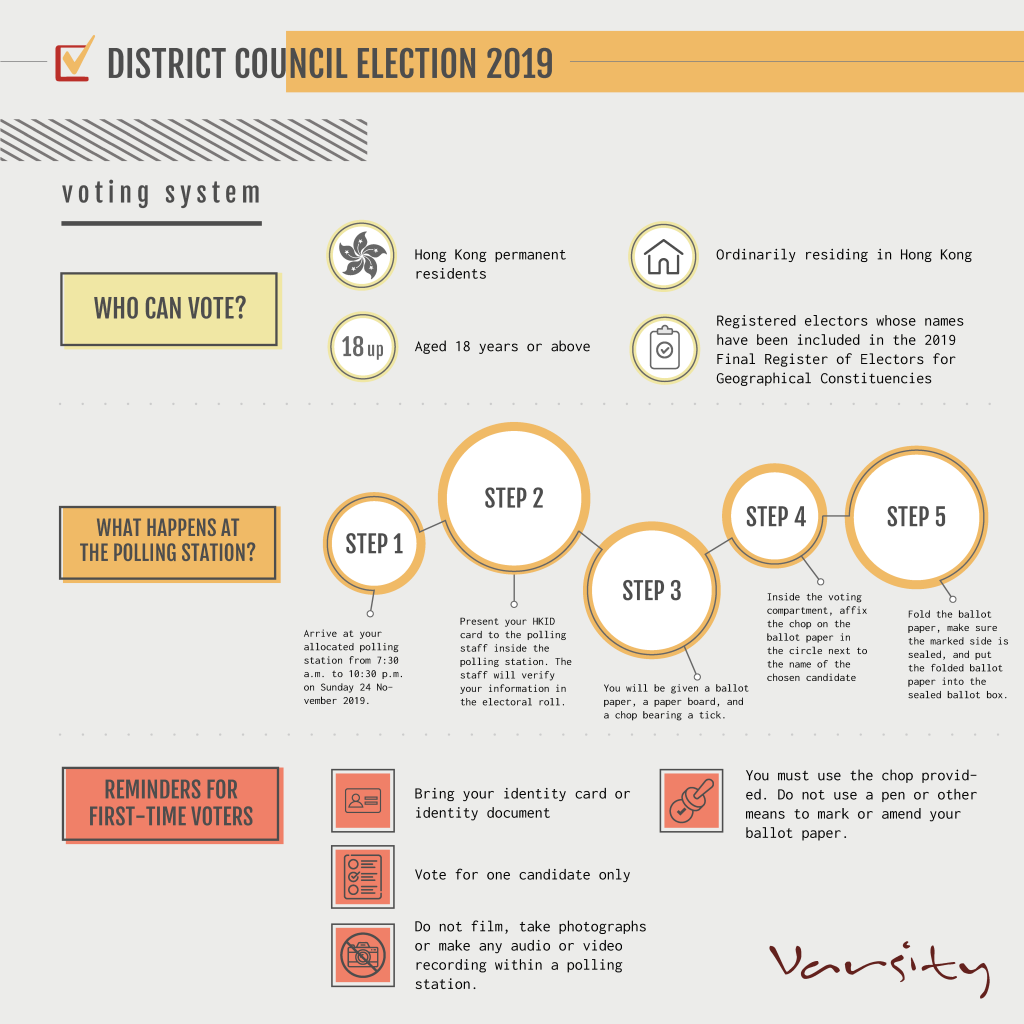
Varsity takes a look at the composition and competition for the District Council before election day (November 24). Here are a few key points.
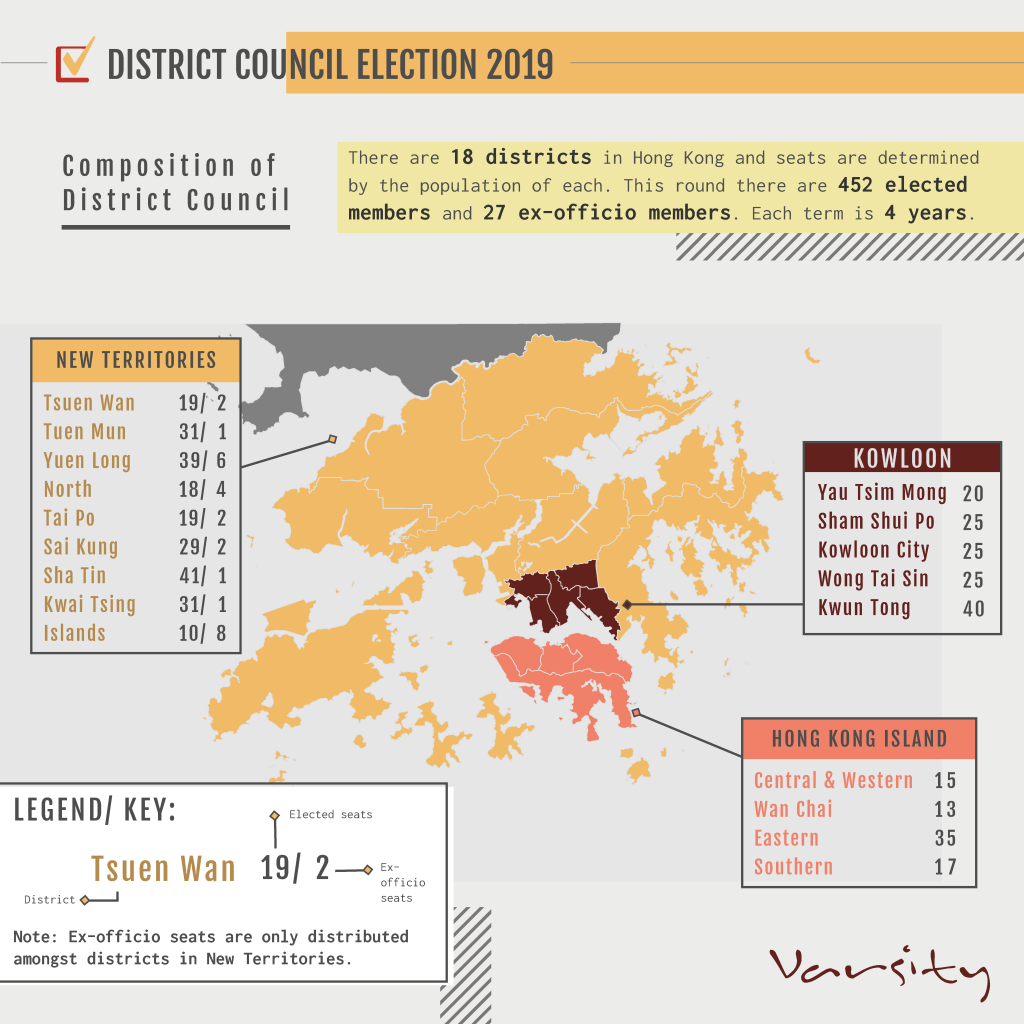
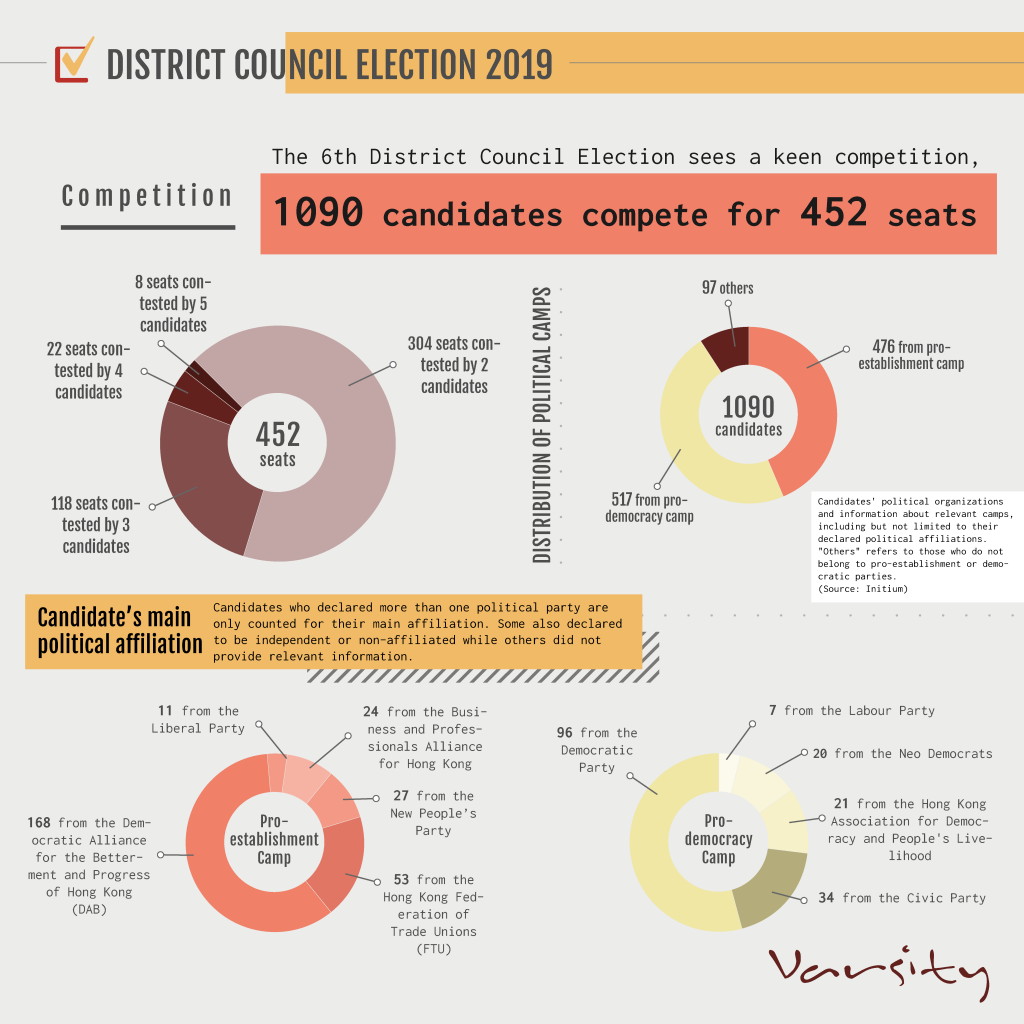
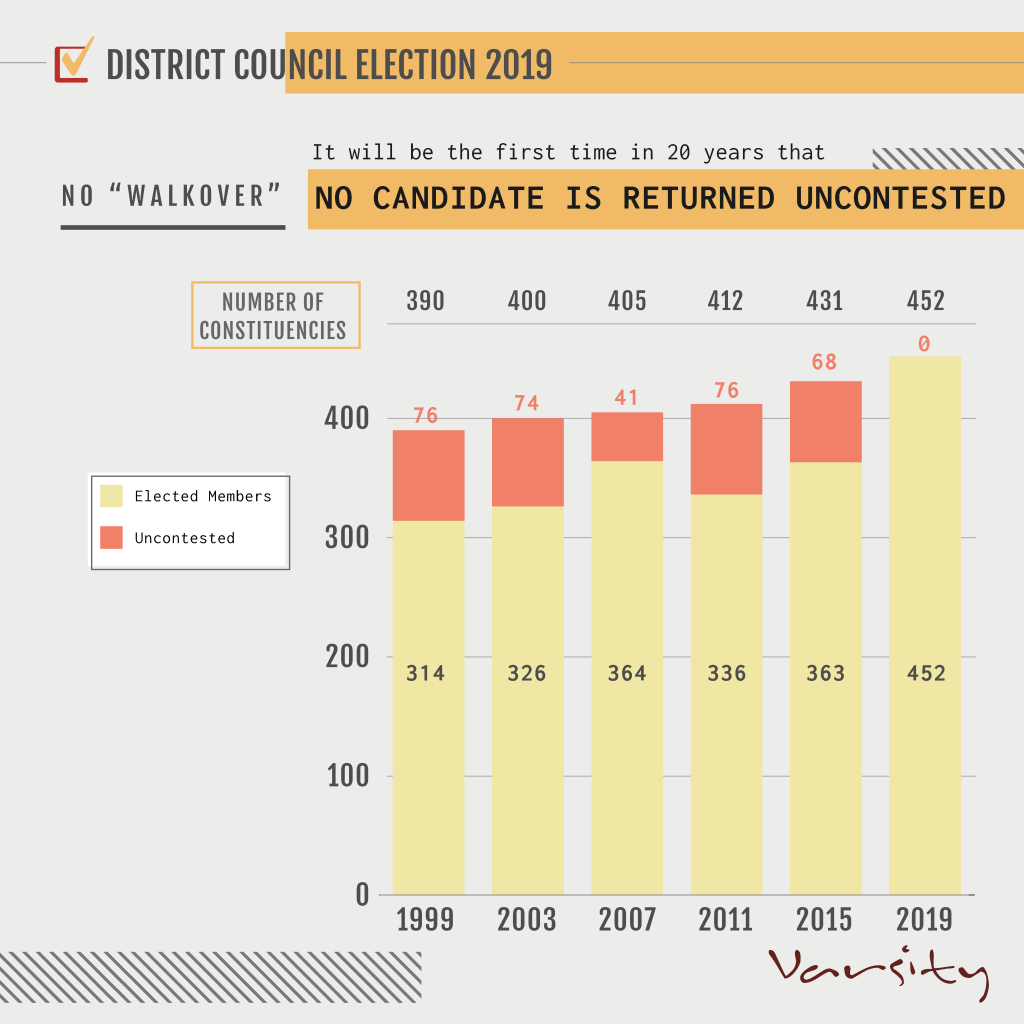
Hong Kong has been plagued by ongoing “leaderless and be water” protests as protesters plan every rally with a fluid and decentralized organizational structure through the help of modern communication technologies.
Hong Kong has been plagued by ongoing “leaderless and be water” protests as protesters plan every rally with a fluid and decentralized organizational structure through the help of modern communication technologies.
The latest wave of protests stemmed from as far as February when the government proposed an amendment to the Fugitive Offenders Ordinance, regarding special arrangements for the transfer of fugitives. Human rights groups and other organizations voiced concerns that fugitives extradited to China would suffer from arbitrary detention and unfair trial under China’s judicial system.
The extradition bill set off a chain of anti-government protests, also known as the Anti-Extradition Law Amendment Bill (Anti-ELAB) Movement, with over one million people who took to the street peacefully on June 9. But the protests took a grim turn in mid-June, when police began to use rubber bullets and tear gas on protesters. Suppressed tensions and distrust, enshrouded after the 2014 Umbrella Movement, resurfaced in the form of flash-mob style protests.
Once again, the city has spiralled into widespread protests, albeit in a different form. In this issue, Varsity looks into the impact of information dissemination and privacy data awareness in the Anti-ELAB Movement.
Local protesters utilise communication and forum applications, such as LIHKG and Telegram, to organise protests and communicate with each other. We speak with organisers, protesters, and experts about how protest coordination is developing in this uncertain political landscape.
Simultaneous to the fast organisation on various online platforms, information is spread to the international community through news reports and social media activism. Activists are also using creative ways to illustrate the situation in Hong Kong. We talk to international activists about discussion abroad and the conflicts that accompany them.
Awareness and concerns with privacy increased following the rapid dissemination of information. Many protesters use extra SIM cards and are often seen in black attire and sanitary masks, even at peaceful protests. We take a look at how protesters protect their identities, the root of their distrust, and the extent of data protection from privacy laws.
Varsity’s reporters and editors worked hard with devotion on this issue. While the government announced on September 4 it would formally withdraw the extradition bill, the fight continues all around us. We may often find ourselves met with suppression, hopelessness, confusion and division. However, even with the conflicts this division brings, we see that each individual cares for this city greatly, in their own way.
We hope this issue may reflect on how our lives have changed, shed light on the developments the protests have gone through, and bring about healthy discussion regarding our city’s future.

Johanna Chan
Ordinary citizens from different countries join hands to campaign for
the Anti-ELAB movement in the international community
By Kayi Tsang, Wayne Chang
During the anti-extradition law amendment bill (anti-ELAB) movement, activists and celebrities attend seminars and conferences in different parts of the world to speak for Hong Kong protesters, while ordinary citizens join hands in their own ways to inform people outside Hong Kong about what is happening in the city.
#Anti-elab, #FreeHongKong and #HongKongPolice are some of the many hashtags Hong Kong netizens use on Twitter, Reddit and Facebook to draw global attention to the movement. They also crowdfund advertisements in overseas newspapers and launch a petition to the White House calling on the U.S. Congress to review the existing extradition agreement with Hong Kong. Gradually, the antiELAB movement has evolved from local protests demanding withdrawal of the bill to a global movement to ‘liberate Hong Kong’.
“Share” it now
Taiwanese artist JieJie is one of those who join the global campaign in support of the movement. He is a co-founder of a popular Facebook page JieJie and UncleCat, which publishes illustrations and has more than 500,000 followers. During the anti-ELAB movement, JieJie has created illustrations on his page with captions explaining the chain of events in Hong Kong, including conflicts between protesters and the police.
His illustrations feature the July 21 incident in which a group of suspected gangsters attacked ordinary citizens at Yuen Long train station and the protest on October 1 during which a policeman shot a young protester with live ammunition have been widely circulated with more than 15,000 and 17,000 shares on Facebook respectively. Through his comic style illustration, JieJie wants to depict brutality and violence reported in news which he finds outrageous in a less stressful manner for his audience who cannot stand looking at bloody pictures and videos.

Although the antiELAB movement mainly takes place in Hong Kong, JieJie thinks it is closely related to Taiwan not only because of the close geographical distance, but also the purpose and meaning of the movement – to resist the system of the Chinese Communist party and fight for democracy.
Responding to his followers’ requests, JieJie translates captions attached with his drawings into English and Japanese with the help of his friends in order to reach out to a wider audience. “I hope my drawings can encourage Hong Kong people and tell people around the world about the seriousness and absurdness of some incidents in Hong Kong,” JieJie says.
Sharing news stories
JieJie is not alone in this journey. Adeline Bong shares his mission of informing her fellow countrymen in Malaysia about what is happening in Hong Kong and reasons behind the protests.

Bong, a Malaysian student who is currently studying at the Chinese University of Hong Kong keeps posting about the movement on her Instagram every day and hopes that her Malaysian friends can understand what is happening before judging or accusing the protesters. Bong says many Malaysians, including her parents, stand against the protesters after reading news stories by Malaysian media outlets.
She has been following news about the movement closely since June by reading posts shared by her Hong Kong friends on Facebook and Instagram. She also participated in several major protests herself.
Bong says that Malaysians, including her friends and family, do not understand the anti-ELAB movement in Hong Kong due to the failure of their local media in reporting how the movement comes into being. “When they report, they do not explain the ins and outs of the whole issue. They only say the airport was congested with 5,000 protesters or conflicts between the police and civilians… because it’s not local news,” she says.
Witnessing numerous protests in Hong Kong with her own eyes, Bong can tell that civil awareness in her home country is low, as people rarely speak up or take to the street regarding social issues. ‘I hope the core values of Hong Kong, like democracy and freedom can be granted completely by the end of the movement,’ she says. ‘If Hong Kong wins the battle, it will be a good role model for us (Malaysians).’

Connecting the West
The anti-ELAB movement does not only concern people living in Hong Kong or its neighbouring countries, but also many ethnic Chinese living around the world. In London, Toronto, Vancouver and other major cities where Mainland Chinese and Hong Kong immigrants inhabit, assemblies and prayer meetings took place in support of the demonstrations in Hong Kong.
Elliott Cheung is a second-generation immigrant in Vancouver. He had lived in Hong Kong, his place of origin, for five years when he was a child. Currently studying in Taiwan, Cheung has kept his fingers on the pulse of the Anti-ELAB movement since its outbreak. While embracing both parts of his Hong Kong-Canadian identity, Cheung says the movement has galvanized his Hongkonger identity and he feels the urge to defend and stand up for that part of him.
From where he lives and studies, Cheung has seen how Chinese societies in different parts of the world are affected by the situation in Hong Kong. “Divisions in overseas Chinese community in Vancouver, particularly between Mainlanders and Hongkongers, have erupted to the surface,” he says. Cheung also acknowledges that his local-born Canadian friends consider the movement as a Chinese problem and is not closely related to them.
Despite different reactions from his multinational friends, Cheung believes that it is essential for the AntiELAB movement to reach out for more global support and attention. He often discusses the issue with his friends and shares news about the movement on social media platforms in an attempt to inform people around him. In response to the shouts from Hong Kong protesters, Cheung attended the Global Anti-Totalitarianism in Taipei on September 29 as well as a student event at his university on October 1.
Cheung thinks there is a unique role for those who are staying overseas or have emigrated and still care about Hong Kong like himself, to actively help people they know to understand the situation in Hong Kong. “I think it is very important for me and for others to continue showing up and speaking out at these events (overseas marches) — for anyone who knows what is happening and feels the injustice of the situation, not to be cowed into silence and inaction,” says Cheung.
— for anyone who knows what is happening and feels the injustice of the situation, not to be cowed into silence and inaction

Kwong Kin-ming, author of Governing Hong Kong: The governance History of Hong Kong in British Colonial Era, acknowledges the intention of arousing global awareness towards the AntiELAB movement through different means, with regard to Hong Kong’s special status in the international stage. “Hong Kong could be the breeding bed for another global economic crisis, since it is an important financial hub in the world,” says Kwong, explaining the reason why the international community should care about Hong Kong’s current situation. He adds that as the city has accommodated multinational businesses, foreign governments would also be concerned with the safety of their people working in Hong Kong, which has already led to discussion in the U.S. Congress.
Kwong believes the Hong Kong- China relation has a fundamental implication on China’s diplomacy with other countries, since Hong Kong’s constitutional principle “One country, Two systems” is promised in the Sino-British Joint Declaration, an international treaty signed by the United Kingdom and China. The current situation in Hong Kong can show whether the Chinese government has kept its promise to honour the international treaty and serve as a reference to show how China handles international treaties and partnership with the rest of the world.
Edited by Raven Hui